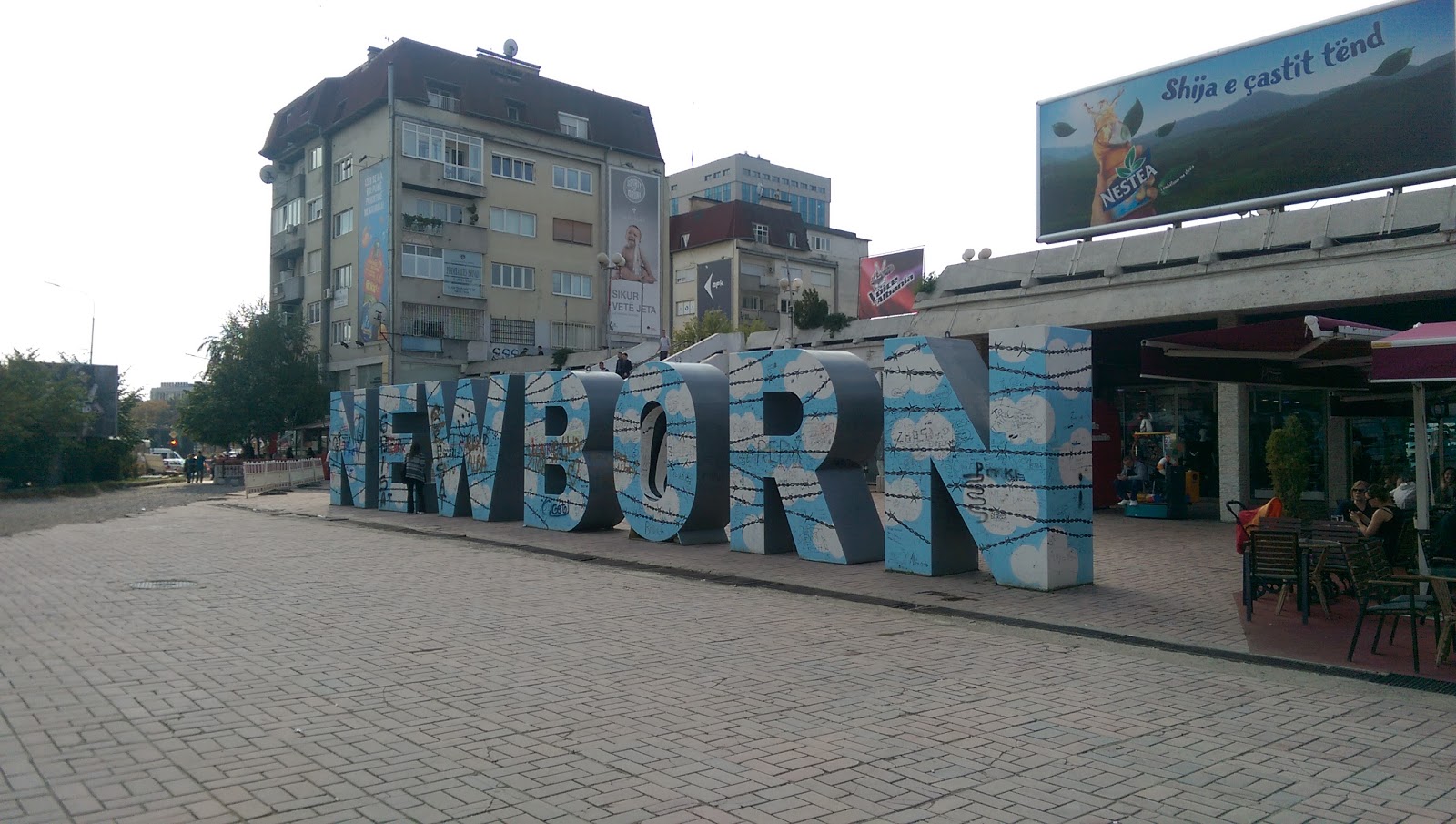
Newborn Monument located in the Palace of Youth designed by Fisnik Ismaili on February 17, 2008 when Kosovo declared independence from Serbia. (photo: The Nation Report)
Editors note: On February 17, 2008, Kosovo declared independence from Serbia.
A little reported story in the United States is that of the survivors of the Kosovo War. The country which is still under struggle for human rights fought a war for independence which by some estimates lasted from 1998-99. But survivors say that the war continues for independence and freedom for some groups of Kosovars. As per the mission statement of The Nation Report, we are here to report on the less-represented voice of the area.
After a series of interviews with members of the Vetevendosje opposition political party, our reporter reports being followed by unknown persons after the last two interviews. We are not certain of the origin or reason for the surveillance, but members of the party also report being followed.
This four-part series begins today, and will continue weekly.
PRISTINA, Kosovo- In a region that has seen much conflict and oppression, is peace possible or is it just a facade that is portrayed by international supporters and the media? Upon first glance Kosovo seems like a country that has recovered from the war and its fight for independence and recognition as a sovereign nation. There are coffee shops and cafes aplenty, alongside new high rise apartment buildings, new highways, and boutiques displaying expensive designer dresses. However, stepping back and conversing with people, one will find there is much to be uncovered beneath the facade.
Much of the conflict and border changes in Kosovo can be attributed to the fact that The Balkans, which includes Kosovo and other countries in South Eastern Europe, are situated between the East and the West which has been prone to destabilization throughout the past and is currently heavily controlled by Serbia. The country itself is made up primarily of ethnic Albanians and about 10% Serbians, but most Kosovars desire their own country – their own sovereign nation that is recognized as a country and independent of Serbia or any nation.
Currently Kosovo suffers from an extremely high unemployment rate, privatization of public entities such as communication networks and transport companies, corruption in the police and army, a poor education and health system, other corruption and an uncertain future.
In an interview with The Nation Report, Arber Zaimi, Political Adviser for the lead opposition political party Vetevendosje stated that, “Right now Kosovo has officially 40% unemployment, but let’s say in real terms, is around 60% of unemployment which makes Kosovo failed, a state of failed economy. This is the reason Kosovo figures very high in numbers of immigrants in [European Union] countries. If someone raises the question, why Kosovo stands near to Syria in those numbers, in Syria there is a war, in Kosovo there is no war. The reason is, in Kosovo there is unemployment, also there [are] criminals who govern, there are criminals which hold economical power and also media power. And an international community which is reluctant to see what is going on and tell the truth about what is going on here.” The poverty rate in Kosovo is 50% with 17-18% in extreme poverty, and there are low average salaries and high prices for basic living necessities. There is also dispute over defining the border between Montenegro and Kosovo which involves around 8000 hectares of land (20,000 acres). This dispute must be resolved before Kosovo acquires visa-free travel to the European Union.
Zaimi was arrested in March of 2016. He was the second party leader to be arrested in less than a week. Another leader, Boiken Abazi was also arrested days earlier and was forcibly removed from Kosovo. In a press release from Vetevendosje, the party said, “It appears that the Kosovo Government is determined to remove from Kosovo every citizen of the Republic of Albania, and just as determined to make it easier for various interventions, both legal and illegal, from Serbia.”
The Kosovo War which took place in the late 90’s was devastating for Kosovo. Slobodan Milosevic, then president of Serbia and later the president of the Federal Republic of Yugoslavia was detrimental for Albanians in Kosovo as he is known for protection of the Serb minority in Kosovo.
The reported violence after the war counted 150,000 homes that were burned, over 20,000 rapes, around 1 million people were either expelled or displaced and 1,200 are still disappeared. According to some of Albanian descent, Milosevic tried to clear Kosovo of Albanians.
Timoslav Nikolic, who is currently the President of Serbia and who served as the Deputy Prime Minister of Serbia during the Milosevic presidency, presented solutions in the early 90’s to the “Albanian problem,” and according to Zaimi, proposed infecting Albanians with HIV.
In 1989 Milosevic revoked Kosovo’s request for autonomy which led to ejection of ethnic Albanians from public employment. Albanian schools and universities were closed and many ethnic Albanians lost their jobs in Kosovo. Frasher Krasniqi, a communication director with Vetevendosje, said that in response, Albanians organized their own educational system by organizing universities illegally in local houses in order to maintain their education system.
Albanians refused to lose their identities. In response to these events, The Democratic League of Kosovo was formed and run by Ibrahim Rugova who led Kosovo from 1992 to 2000 and 2002 to 2006. Rugova advocated for liberation from Serbia, and also advocated for peace in creating Kosovo. “However, he was too passive,” Krasniqi quotes Rugova as having said, “We shouldn’t do anything because Serbia will kill us all. We have to be quiet.”
After time, this was not enough for the people of Kosovo who saw no change, and most desired change.